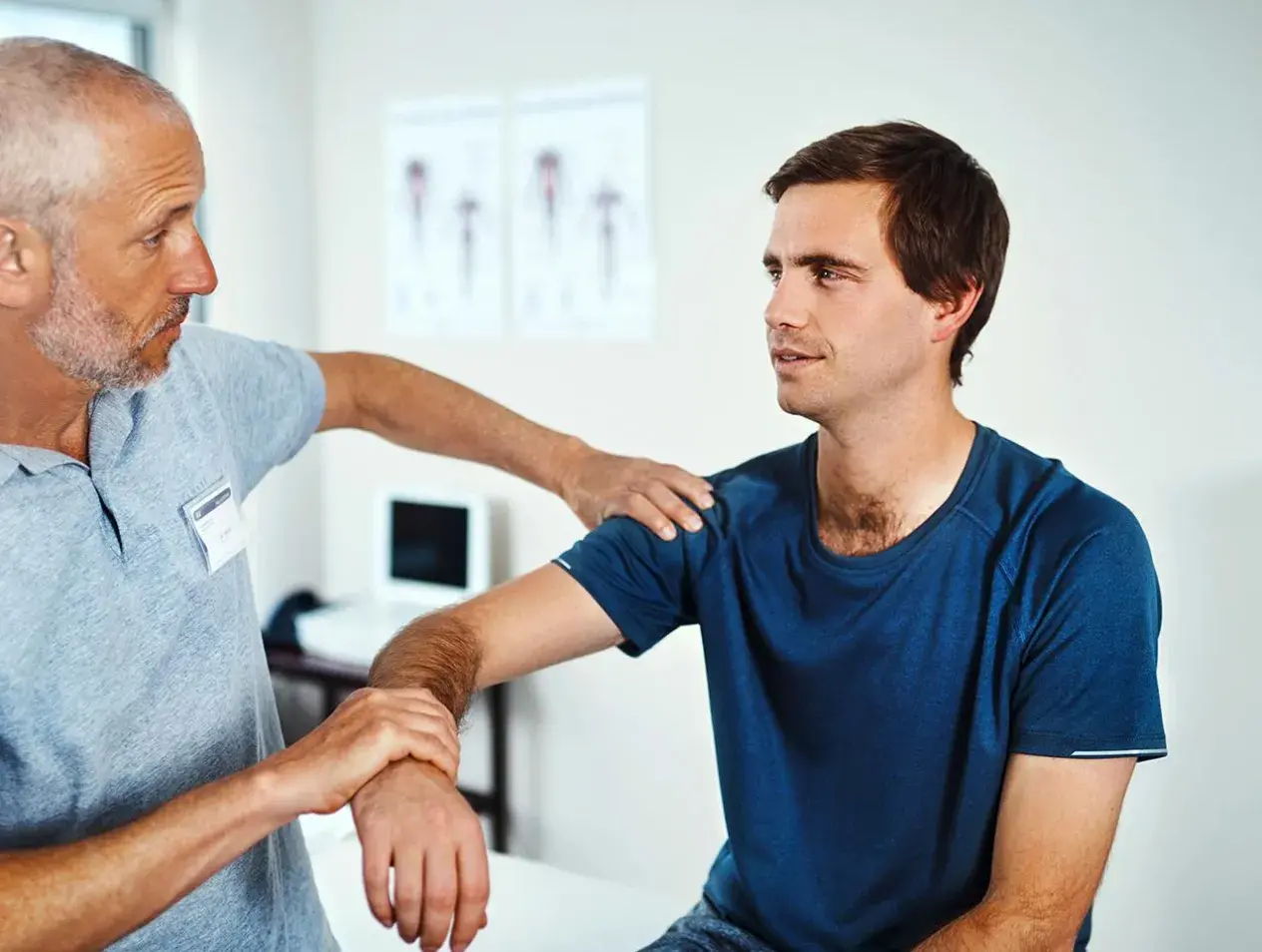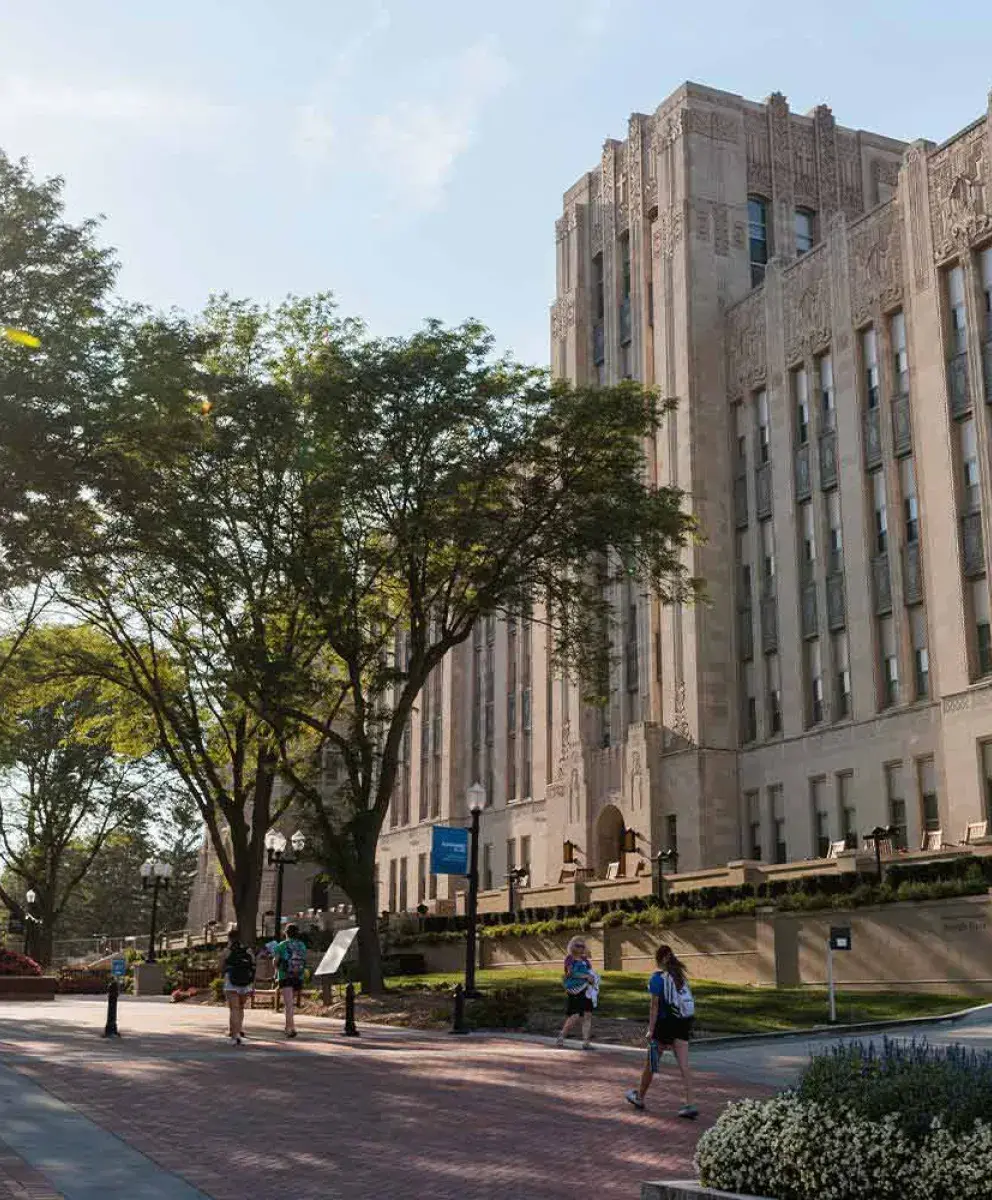
Creighton Therapy and Wellness
Omaha’s Premier Physical Therapy Clinic
Creighton Therapy and Wellness serves the public by offering individualized outpatient physical therapy (PT) to patients of all ages. At this faculty-led PT practice, our physical therapists provide specialized treatments for conditions ranging from chronic pain to pelvic floor issues. Patients at both our locations will experience one-on-one, evidence-based care that reflects the latest available research.
Contact Us
Phone: 402.280.3555
Fax: 402.280.3557
therapy@creighton.edu
A PT Treatment Plan Built for You
Our physical therapists will develop a plan specific to your needs. During your initial evaluation (which is separate from the free assessment), a physical therapist will determine treatment plan options to meet your goals. Contact our office to schedule your initial appointment at 402.280.3555.
Treatment plans could include:
- Therapeutic exercise focused on stretching, strengthening or range of motion
- Manual therapy techniques such as dry needling, soft tissue mobilization, home exercises or modalities like electrical stimulation, iontophoresis, and heat or cold
- Isokinetic, resistance-based exercises
- Force plates to measure shock absorption during walking and running
- Biofeedback (EMG), which uses visual or sound signals to monitor muscle activity
- Aquatic therapy
- Balance training
- Blood flow restriction rehabilitation
- Ergonomic assessment
- Joint mobilization
- McKenzie therapy, which is musculoskeletal care emphasizing patient empowerment and self-treatment
- Patient education
- Rehabilitation for endurance, golf performance, gymnastics and cheerleading, head, hip, overhead throwing, performing arts
- Temporomandibular joint and vestibular rehabilitation
PT Services
We use novel approaches to effectively treat patients for a range of conditions, including the following:
- Bed wetting
- Breast cancer and lymphedema
- Constipation
- Encopresis (fecal soiling)
- Pediatric bowel and bladder disorders
- Pelvic organ prolapse
- Pelvic pain
- Pre- and post-surgical
- Pregnancy and post-partum conditions or pain
- Post-prostatectomy rehabilitation
- Sexual dysfunction
- Urinary or fecal incontinence
- Urinary urgency
Orthopedic Services
Our clinical specialists at Creighton Therapy and Wellness are trained to treat conditions of the bones, muscles, soft tissues and joints such as:
- Acute and chronic pain
- Arthritic pain
- Ankle and foot injuries
- Auto injuries
- Back pain
- Balance deficits
- Dizziness
- Elbow pain
- Headaches
- Hip injuries
- Jaw pain
- Joint replacement
- Knee injuries
- Lymphedema
- Muscle strains and sprains
- Neck pain
- Orthopedic injuries
- Osteoporosis
- Overuse injuries
- Sports injuries
- Work-related injuries
Therapeutic Specialties
It’s estimated that more than 17 million Americans suffer from urinary incontinence. Yet many don’t seek help for their symptoms, which can include urinary leakage when sneezing, coughing, or laughing (i.e., stress incontinence) or strong, sudden urges to urinate without the ability to control leakage (i.e., urgency urinary incontinence). Pelvic floor muscles can prevent urinary leakage when they’re strong and used appropriately. In fact, physical therapy can help to strengthen these muscles, which may have become weakened due to pregnancy and delivery, pelvic surgeries, obesity, chronic coughing or chronic constipation.
Pregnancy: During pregnancy, fluctuating hormones can cause changes in a woman’s posture, center of gravity, weight and abdominal strength. This can lead to a range of aches and pains in the back, neck and tailbone, as well as in the legs (in conjunction with back pain) and ribs. Other issues that may arise during pregnancy include carpal tunnel syndrome, urinary leakage, headaches and pubic symphysis pain. Gentle therapeutic exercises may provide relief from all these pregnancy-related symptoms. In addition, our physical therapists can offer treatments such as stabilization training, soft tissue mobilization, muscle energy techniques and postural training. They can also properly fit and supply maternity support belts, which may provide relief from symptoms.
Post-partum: Nursing and childcare can place stress on the back and abdomen, and some new mothers experience urinary stress incontinence. Yet strengthening the abdominal and pelvic floor muscles can help address these issues. Our physical therapists can provide guided exercise routines, as well as suggestions for completing childcare activities in ways that may prevent back injuries.
Breast surgeries to address cancer, such as lumpectomies and mastectomies, can alter not only a person’s body image, but also upper body and arm strength or range of motion. Posture may also be affected. Our physical therapists can help—with exercises to increase strength, flexibility and mobility.
Additionally, our therapists can provide treatment for lymphedema, which is a condition that causes swelling in the arm or chest (and may develop after a breast surgery). Therapy options include manual lymph drainage and compression bandaging. Therapists will also provide information about preventing and managing lymphedema.
Pelvic pain and sexual dysfunctions can be debilitating, but they’re often dismissed or remain undiagnosed. At Creighton Therapy and Wellness, we want to help those with these conditions restore their quality of life and intimate relationships with their partners. Conditions we treat include dyspareunia (painful intercourse), vestibulitis, vulvodynia, anorgasmia and vaginismus. A significant contributor to these dysfunctions is hypertonicity (muscle spasm) in the pelvic floor muscles, which we can address through a range of therapies. Treatment approaches may include soft tissue mobilization and trigger point release, biofeedback for relaxation of the pelvic floor muscles, electrical stimulation, vaginal dilatory therapy and lumbopelvic stabilization exercises.
Osteoporosis occurs when bone begins to deteriorate, becoming fragile and more likely to fracture or break. One way to avoid fractures—particularly in the hips and spine—is through weight-bearing exercises. Our physical therapists can prescribe these exercises, such as a walking program or weightlifting. Therapy may also include balance exercises and recommendations to prevent falls around the house. In addition to these treatments, we suggest that patients with osteoporosis avoid alcohol and smoking, and they should talk with their physicians about calcium and vitamin D.
The causes of male pelvic pain are varied and sometimes difficult to identify; pain may be a result of abdominal or pelvic surgeries, prolonged sitting or compression on the perineum, improper body mechanics, infections, or chronic straining or pushing when producing bowel movements. Pelvic floor musculature is often associated with pain that’s diagnosed as pudendal neuralgia or entrapment, chronic prostatitis, urinary or fecal incontinence, chronic constipation, penile and testicular pain, overactive bladder, or painful bladder syndrome. At Creighton Therapy and Wellness, we are trained to help assess whether those with these conditions need to strengthen or relax their pelvic floor muscles. Our physical therapists can then determine the most appropriate treatment and exercise programs.
Physical Therapy Services: Our staff includes board-certified clinical specialists in neurologic physical therapy. These therapists can provide evaluations and treatments to maximize function and optimize healthy living for people with chronic neurologic conditions. Physical therapy treatments can be ideal for those who are experiencing a change in function or steadiness; an increased fear of falling; a gradual increase in pain; or new or unmet goals. Therapists can also provide insights on approaches for healthy living with a neurologic condition. In addition to prescribing exercise focused on functional abilities, our therapists can offer balance and vestibular rehabilitation and a LSVT BIG training program for Parkinson’s Disease.
Wellness Services: The CDC recommends people with chronic neurologic conditions, such as stroke, brain injury, Parkinson’s Disease and multiple sclerosis (MS), should engage in both aerobic and strengthening exercises. Our neurologic clinical specialists can help those with these conditions be as active as possible through balance and movement screens, as well as the Healthy Habits Exercise Class.
Our balance and movement screens are designed to provide wellness clients with baseline information about their fall risks, while also empowering them to seek services that may prevent functional decline, optimize function and increase awareness of abilities. Balance and movement screens are available upon request; please contact us for scheduling and payment options. Note that balance screens are automatically included in a client’s first Healthy Habits Exercise Class.
The Healthy Habits Exercise Class is a unique weekly fitness class designed to provide opportunities for physical activity in a friendly, inclusive environment. Participants will be led through aerobic and strengthening exercises by Creighton University physical therapy students and staff, and modifications will be provided for completing exercises in seated or standing positions. Since this is a group fitness class, individualized assistance will not be available, but caregivers are welcome to attend.
- When: Fridays from 11 a.m. – Noon*
- Where: Creighton Therapy and Wellness in Omaha at 17055 Frances Street, Suite 100; a virtual option is also available
- Cost: The first class, which includes a balance screening, is $20. Subsequent classes start at $10 per class or $30 for a monthly membership.**
*Times are subject to change. Please contact us to confirm and preregister.
**Creighton Therapy and Wellness reserves the right to adjust pricing on the first day of every calendar year. A notification will be provided.
Telehealth Services
We can provide convenient, personalized consultation for patients with our telehealth services. Our therapists will provide creative solutions based on the space and equipment already in a patient’s home. Note that insurance coverage varies for telehealth services, and these services are dependent on insurance verification. For more information, email Creighton Therapy and Wellness or call us at 402.280.3555.

Feedback and Complaints
A patient, family member or guardian has the right to file a grievance or complaint with Creighton Therapy and Wellness if they feel that the clinic or provider has not met the needs or expectations for rehabilitation services. Complaints may be submitted by emailing the Clinic Director, Julie Peterson or calling the clinic. If a complaint warrants a follow up, the individual filing the complaint will be contacted by phone or secure email.
Non-Discrimination Statement
Creighton University does not discriminate against any person on the basis of race, color, national origin, sex, gender identity or expression, sexual orientation, genetic information, marital status, disability, religion, age, veteran status or any other characteristic protected by applicable law in its employment, educational programs and activities, admissions policies, and scholarship and loan programs as required by Title IX of the Educational Amendments of 1972, the Americans with Disabilities Act of 1990, Section 504 of the Rehabilitation Act of 1973, Title VII of the Civil Rights Act of 1964, and other applicable statutes and University policies. Creighton University also prohibits unlawful harassment including sexual harassment and sexual violence.
Contact Us
Phone: 402.280.3555
Fax: 402.280.3557
therapy@creighton.edu
West Omaha Clinic
17055 Frances St., Suite 100
Omaha, NE 68130
Campus Clinic
Cardiac Center
3006 Webster St
Omaha NE 68131
Open Monday – Friday.
Please call 402.280.3555 for hours of operation.
Clinic Director:
Julie Peterson, PT, DPT, WCS, BCB-PMD
Clinic Manager:
Catherine Hughes-Rose
Therapists

Kari Bargstadt-Wilson, PT, MPT, WCS, CSCS
- Physical Therapist
- 402.280.3555
- View Profile

Morgan Garrett, PT, DPT, OCS
- Physical Therapist
- 402.280.3355
- View Profile

Julie Anne Peterson, PT, DPT, EdD
- Associate Professor
- 402.280.5671
- View Profile

Nicholas Weber, PT, DPT, OCS, FAAOMPT
- Assistant Professor
- 402.280.5299
- View Profile
Staff

Michaela Hawley
- Clinic Support Specialist
- 402.280.2200
- View Profile

Catherine Hughes-Rose
- Clinic Manager
- 402.280.2246
- View Profile

Paula Kennedy
- Clinic Support Specialist
- 402.280.3555
- View Profile





